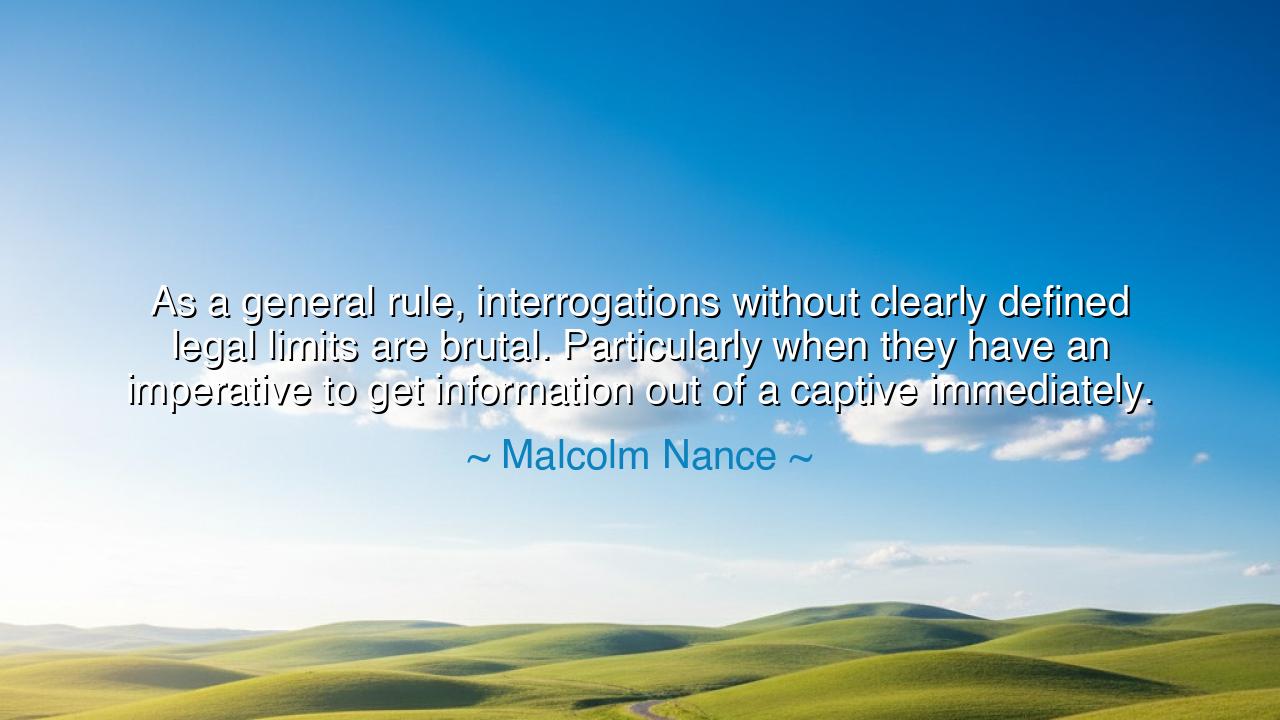
As a general rule, interrogations without clearly defined legal
As a general rule, interrogations without clearly defined legal limits are brutal. Particularly when they have an imperative to get information out of a captive immediately.






When Malcolm Nance declared, “As a general rule, interrogations without clearly defined legal limits are brutal. Particularly when they have an imperative to get information out of a captive immediately,” he was not speaking from theory, but from the bitter well of experience. His words rise like a warning from the depths of war — a cry against the ancient temptation that power faces in the shadow of fear. He reminds us that when law and morality are abandoned in the pursuit of urgency, men quickly become what they claim to fight against. His statement is not simply about interrogation; it is about the fragile line between civilization and savagery, between justice and vengeance, between order and chaos.
In the style of the ancients, one might say that Nance spoke as a seasoned soldier turned philosopher, as one who has looked into the heart of darkness and returned to tell the tale. His words echo the wisdom of the old prophets who warned that unbounded power corrupts not only the body but the soul. To interrogate without law is to step into the realm of the beast — where pain replaces truth, and cruelty replaces reason. When the mind of man believes that the end justifies the means, the spirit of humanity begins to rot from within. Nance’s warning thus transcends war and speaks to all forms of authority: whether in the battlefield, the courtroom, or the chamber of politics, power without restraint inevitably breeds brutality.
The origin of this quote lies in Nance’s deep knowledge of intelligence and counterterrorism, born from decades of service in the U.S. Navy and his study of interrogation practices around the world. Having witnessed firsthand the moral corrosion that arises when fear dictates action, Nance became a critic of torture and extralegal interrogation, especially during the years following September 11. In those years of turmoil, the desperate hunt for information led many to forsake the principles of due process and human rights. What began as the pursuit of safety turned into a descent into moral compromise, where even democracies flirted with the methods of tyranny. From this crucible, Nance’s words emerge — a call to remember that law is not a hindrance to justice, but its foundation.
History offers countless reflections of this truth. The Inquisition of medieval Europe, born under the banner of purity and truth, became one of the darkest stains upon Christendom. Priests and judges, convinced they were serving God, tortured confessions from the innocent, believing that pain could reveal the divine truth. But the more they sought truth through torment, the further they drifted from righteousness. The ancients would have recognized this irony well — that the pursuit of truth without virtue becomes the practice of evil. And so it was in later centuries too: in the dungeons of secret police, in the camps of the 20th century, wherever fear granted men the license to abandon the law, cruelty followed close behind.
Nance’s warning cuts to the very heart of the human condition. When he says that interrogations without limits are brutal, he is not simply describing what happens — he is describing what men become. The imperative to “get information immediately” creates a storm of panic that erases thought and replaces it with instinct untempered by conscience. In such moments, mercy is forgotten, and truth itself becomes suspect. For torture does not yield clarity; it yields confusion, desperation, and lies. As the ancient philosophers taught, the truth cannot be extracted by force — it must be revealed through understanding and justice. The more violently one demands it, the more it recedes into darkness.
The lesson of Nance’s words is clear: law is the armor of morality, and when it is cast aside, humanity is left naked before its own brutality. A just society must never allow fear, however grave, to dictate its ethics. For when fear rules the mind, even the righteous become tyrants. The purpose of law is not to hinder those who seek truth, but to protect both seeker and subject from descending into moral ruin. To act without boundaries, even for noble reasons, is to sow the seeds of one’s own destruction. Every civilization that has forsaken restraint in the name of security has paid for it in blood and shame.
So let this teaching be passed down to future generations: the strength of a nation is not measured by how swiftly it acts, but by how faithfully it holds to its principles in times of fear. The warrior who restrains his hand in the midst of anger is stronger than the one who strikes in rage. The interrogator who honors the law, even when urgency screams otherwise, is the true guardian of justice. For in the end, it is not merely the captive who is tested in moments of power — it is the captor, and through him, the very soul of his civilization. Let us then remember Nance’s wisdom: that lawful restraint is not weakness, but the highest form of strength, and that the measure of any people lies not in how they fight their enemies, but in how they preserve their humanity while doing so.






AAdministratorAdministrator
Welcome, honored guests. Please leave a comment, we will respond soon